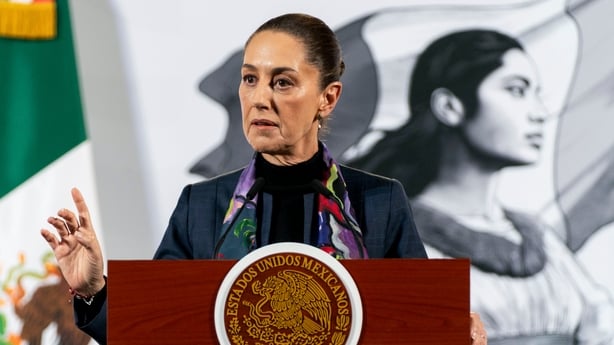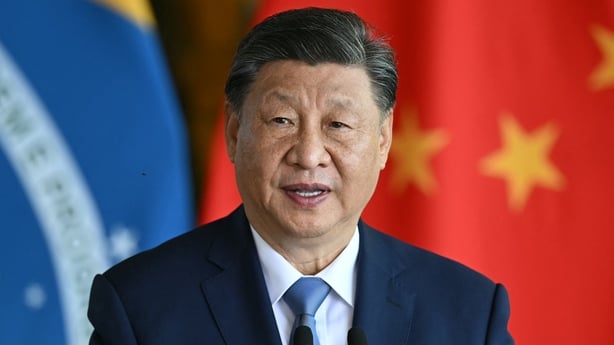US President Donald Trump has said that Americans may feel economic "pain" from his tariffs on key trading partners but argued it would be "worth the price" to secure US interests.
Mr Trump finally signed off on threatened 25% tariffs on neighbouring Mexico and Canada, despite sharing a free trade pact, and hit China with a 10% tariff in addition to already enacted levies.
He had vowed since before his inauguration to take such action, claiming the countries were not doing enough to halt illegal immigration and the trafficking of the deadly opioid fentanyl into the United States.
In imposing the tariffs, which are set to begin Tuesday, Mr Trump invoked the International Emergency Economic Powers Act.
The move provoked immediate vows of retaliation from all three countries, while analysts warned that the ensuing trade war would likely slow US growth and raise consumer prices over the short term.
"Will there be some pain? Yes, maybe (and maybe not!)" Mr Trump wrote this morning in all-caps on his Truth Social media platform.
"But we will Make America Great Again, and it will all be worth the price that must be paid," he added.
We need your consent to load this rte-player contentWe use rte-player to manage extra content that can set cookies on your device and collect data about your activity. Please review their details and accept them to load the content.Manage Preferences
Mr Trump and his advisers had previously resisted acknowledging that tariffs could raise US consumer prices after frustration over rising costs was seen as a major factor in his November election victory over Democrat Kamala Harris.
Apparently seeking to limit a spike in fuel and electricity prices, Mr Trump put the levy on energy imports from Canada at only 10%.
In a separate social media post, Mr Trump called again for America's northern neighbour to become a US state, heightening tensions further with one of his country's closest allies.
While claiming the United States pays "hundreds of billions of dollars to subsidise Canada," he added, "Without this massive subsidy, Canada ceases to exist as a viable country".
"Therefore, Canada should become our Cherished 51st State," he wrote on Truth Social, claiming the move would bring "much lower taxes, and far better military protection for the people of Canada - and no tariffs!".
The US Census Bureau listed the country's 2024 trade deficit in goods with Canada as $55 billion.
Canadian Prime Minister Justin Trudeau vowed that his country would hit back with 25% levies of its own on select American goods worth almost €103 billion, with a first-round on Tuesday followed by a second one in three weeks.
Leaders of several Canadian provinces have already announced retaliatory actions as well, such as the immediate halt of US alcohol purchases.
As relations between the long-time allies who share the world's longest land border reach a new low, Mr Trudeau warned the coming weeks would be difficult for Canadians and that Mr Trump's tariffs would also hurt Americans.
Addressing Americans, he said: "They will raise costs for you, including food at the grocery store, gas at the pump. They will impede your access to an affordable supply of vital goods."
The Canadian leader said tariffs would include American beer, wine and bourbon, as well as fruits and fruit juices, including orange juice from Mr Trump's home state of Florida.
Canada would also target goods including clothing, sports equipment and household appliances.
The northern neighbour to the US is considering non-tariff measures, potentially relating to critical minerals, energy procurement and other partnerships, Mr Trudeau said.
The Canadian leader also encouraged Canadians to buy Canadian products and holiday at home rather than in the US.
"We didn't ask for this but we will not back down," Mr Trudeau said.
White House officials also said that Canada would no longer be allowed the "de minimis" US duty exemption for small shipments under $800.
The officials said Canada, along with Mexico, has become a conduit for shipments of fentanyl - a deadly opioid - and its precursor chemicals, into the US, via small packages that are not often inspected by customs agents.
Mexican President Claudia Sheinbaum meanwhile said she had directed her economy minister to "implement Plan B," which includes yet-unspecified "tariff and non-tariff measures".

In a lengthy post on X, Ms Sheinbaum said her government sought dialogue rather than confrontation with its top trade partner to the north, but that Mexico had been forced to respond in kind.
"I've instructed my economy minister to implement the plan B we've been working on, which includes tariff and non-tariff measures in defense of Mexico's interests," Ms Sheinbaum posted, without specifying what US goods her government will target.
The United States is by far Mexico's most important foreign market, and in 2023 Mexico overtook China as top destination for US exports.
Mexico has been preparing possible retaliatory tariffs on imports from the US, ranging from 5% to 20%, on pork, cheese, fresh produce, manufactured steel and aluminium, according to sources familiar with the matter.
The auto industry would initially be exempt, they said.
Economy Minister Marcelo Ebrard said on X that Mr Trump's tariffs were a "flagrant violation" of the US-Mexico-Canada Agreement.
"Plan B is underway," Mr Ebrard said. "We will win!"
US exports to Mexico accounted for more than $322 billion in 2023, Census Bureau data showed, while the US imported more than $475 billion worth of Mexican products.
In her post, Ms Sheinbaum also rejected as "slander" the White House's allegation that drug cartels have an alliance with the Mexican government, a point Trump's administration used to justify the tariffs.
On Friday, the right-leaning editorial board of the Wall Street Journal newspaper blasted Mr Trump's tariffs in a piece titled "The Dumbest Trade War in History," saying, "American consumers will feel the bite of higher costs for some goods".
In response, Mr Trump said: "The 'Tariff Lobby,' headed by the Globalist, and always wrong, Wall Street Journal, is working hard to justify ... the decades long ripoff of America, both with regard to trade, crime and poisonous drugs."
He has long decried US trade deficits as a sign of other countries taking advantage of Americans.
He has also repeatedly threatened trade actions against the European Union.
A spokesperson for the bloc vowed that it would "respond firmly to any trading partner that unfairly or arbitrarily imposes tariffs".
EU vows firm response if Trump unleashes tariffs
The European Union insisted it would retaliate "firmly" if President Trump hit it with tariffs, as it decried his sweeping measures against Canada, Mexico and China.
The EU until now has said it hopes to avoid a trade conflict with the US through negotiation.
However, Mr Trump doubled down by saying he "absolutely" planned to target the EU in future
"The European Union regrets the US decision to impose tariffs on Canada, Mexico and China," said a spokesman for the European Commission.
"Tariffs create unnecessary economic disruption and drive inflation. They are hurtful to all sides."
The spokesman said: "The EU would respond firmly to any trading partner that unfairly or arbitrarily imposes tariffs on EU goods."
"At this time, we are not aware of any additional tariffs being imposed on EU products," he added.
He said the EU remained committed to low tariffs to "drive growth and economic stability within a strong, rules-based trading system".
And he reiterated the EU's commitment to its trade and investment relationship with the United States -- "the biggest in the world".

"There is a lot at stake," said the spokesman. "We should both be looking at strengthening this relationship."
Mr Trump has not hidden his enmity for the EU, accusing it of treating the United States "very, very unfairly" on trade.
China pushes back, says 'fentanyl is America's problem'
China said it will challenge Mr Trump's tariff at the World Trade Organization and take unspecified "countermeasures" in response to the levy.
The response stopped short of the immediate escalation that had marked China's trade showdown with Mr Trump in his first term as president and repeated the more measured language Beijing has used in recent weeks.
China's commerce ministry said in a statement that Mr Trump's move "seriously violates" international trade rules, urging the US to "engage in frank dialogue and strengthen cooperation".
Filing a lawsuit with the WTO would be a largely symbolic move that China has also taken against tariffs on Chinese-made electric vehicles by the European Union.
For weeks Chinese Foreign Ministry spokesperson Mao Ning has said Beijing believes there is no winner in a trade war.
China's sharpest pushback was over fentanyl, an area where the Biden administration had also been urging China to crack down on shipments of the China-made precursor chemicals needed to manufacture the drug.
"Fentanyl is America's problem," China's foreign ministry said. "The Chinese side has carried out extensive anti-narcotics cooperation with the United States and achieved remarkable results."

